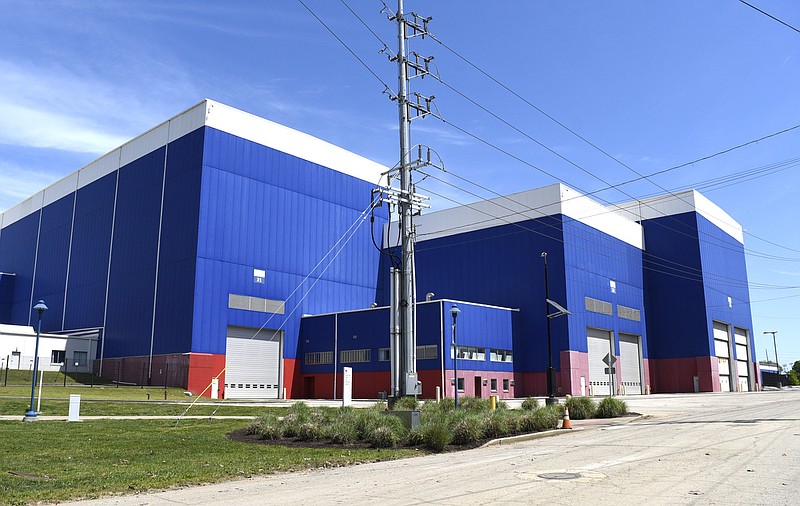As case number projections improve, officials are "cautiously optimistic" that an overflow hospital to handle a surge in COVID-19 patients won't be necessary in Hamilton County.
A potential surge hospital set for the "Big Blue" riverfront building at Chattanooga's former Alstom manufacturing site - a plan announced just last week - may not be necessary to treat the local coronavirus outbreak which has infected more than 100 people and killed 10 county residents.
The building could be capable of holding around 1,500 additional hospital beds if cases outgrow the capacity of existing hospitals. That's more than four times the capacity of the Chattanooga Convention Center, previously scouted for an alternate hospital site.
While the large boost in capacity seemed to suggest higher case projections, County Mayor Jim Coppinger said the decision to switch sites was about business, not beds.
"The plan to switch from the convention center to Alstom has nothing to do with beds. If you're going to set up an alternative hospital site, it will be over several months," Coppinger said Friday. "The state is looking at other buildings like Alstom in other cities too, because you know, if social distancing starts to end but the hospital is still necessary, that would impact the convention center more than it would a vacant building."
Coppinger said he is hopeful neither site will be necessary.
"You always hope that you can minimize the impact of a crisis and the number of people hospitalized, but we remain cautiously optimistic that we won't need the beds at all, even though we have planned to have a contingency all along, just in case," Coppinger said. "Now we haven't defeated this yet, but the numbers have been looking better even compared to just a few weeks ago because of social distancing, contact tracing and increased testing."
Hamilton County has 340 medical/surgical beds, 71 intensive care beds and 343 adult ventilators, according to Hamilton County Emergency Management.
The county also has the following pediatric equipment: 42 medical/surgical beds, eight intensive care beds and 38 ventilators.
Data released by the Chattanooga-Hamilton County Health Department Thursday shows just over 50 combined patients and suspected cases of COVID-19 in county hospitals.
Those numbers appear to be making more than just Coppinger optimistic.
Jimmy White, one of the Alstom site owners, told the Times Free Press on Friday that the state seemed to be pumping the brakes on the previously urgent process of establishing the overflow hospital.
"Monday it was a mad rush to get preparation. On Wednesday, it was a little different," White said, noting that representatives of the state and U.S. Army Corps of Engineers had changed their tone midweek. "I think they're not seeing the surge that they thought was coming, which was a good thing, and the option now is to wait with anticipation and see what happens with the next 30, 60 or 90 days."
On April 5, the University of Washington's Institute for Health Metrics and Evaluation lowered its coronavirus projections for Tennessee. The institute estimated 587 could die by Aug. 4 as a result of the outbreak, a substantial reduction from a previous estimate of as many as 3,400 deaths by Aug. 4.
The lower estimate followed Gov. Bill Lee ordering Tennesseans to stay at home unless they are engaged in "essential activities or essential services" until at least April 14.
White said that while the state no longer seems to need the Alstom property, the site will remain available just in case.
"At this point, I think we're on call, so to speak," White said. "The state and Corps of Engineers have come to an agreement, and I don't think they need the capacity at this point. But if they do, we're in waiting."
Tennessee's COVID-19 Unified Command Group, the state entity coordinating response to the outbreak, would not confirm any change in anticipated need for a surge hospital.
"The state is planning for short-term surge needs and evaluating longer term facility options, and nothing is off the table at this time," Dean Flener, a spokesman for the group, said by email on Saturday. "We'll announce any further details regarding planning and timing as we put those pieces in place."
While Flener confirmed that the hospital would be funded by the federal government under a recent major disaster declaration, he was unable to answer other questions by the Times Free Press about cost, staffing and logistics of the proposed hospital.
"The state is looking at many predictive models for surge capacity planning. All vary as to surge date predictions and are evaluated to give the state a general sense of direction," Flener wrote. "We are being very thoughtful in our decision making about utilizing the evaluated sites. The alternate care site planning process and determination remains very fluid, and it would be premature to say right now which facilities will, or will not, be needed."
Contact Sarah Grace Taylor at staylor@times freepress.com or 423-757-6416. Follow her on Twitter @_sarahgtaylor.
